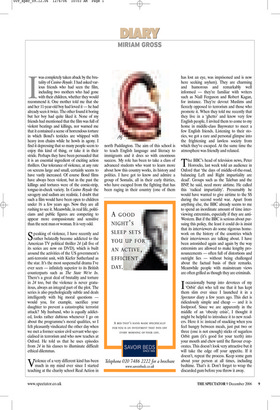I was completely taken aback by the brutality of Casino Royale .
I had asked various friends who had seen the film, including two mothers who had gone with their children, whether they would recommend it. One mother told me that she and her 11-year-old boy had loved it — he had already seen it twice. The other found it boring but her boy had quite liked it. None of my friends had mentioned that the film was full of violent beatings and killings, nor warned me that it contained a scene of horrendous torture in which Bond’s testicles are whipped with heavy iron chains while he howls in agony. I find it depressing that so many people seem to enjoy this kind of thing, or take it in their stride. Perhaps they have been persuaded that it is an essential ingredient of exciting action thrillers. Our tolerance of violence, at any rate on screens large and small, certainly seems to have vastly increased. Of course Bond films have always been violent, but in the past the killings and tortures were of the comic-strip, tongue-in-cheek variety. In Casino Royale the savagery and sadism are realistic. I doubt that such a film would have been open to children under 16 a few years ago. Now they are all rushing to see it. Meanwhile, in real life, politicians and public figures are competing to appear more compassionate and sensitive than the next man or woman. It is very odd.
Speaking of violence, I have recently and rather belatedly become addicted to the American TV political thriller 24 (all five of its series are now on DVD), which is built around the activities of the US government’s anti-terrorist unit, with Kiefer Sutherland as the star. It’s the most suspenseful drama I’ve ever seen — infinitely superior to its British counterparts such as The State We’re In. There’s a great deal of brutality and torture in 24 too, but the violence is never gratuitous, always an integral part of the plot. The series is also psychologically subtle and deals intelligently with big moral questions would you, for example, sacrifice your daughter to prevent a catastrophic terrorist attack? My husband, who is equally addicted, looks rather dubious whenever I go on about the programme’s moral qualities, so I felt pleasantly vindicated the other day when we met a former senior civil servant who specialised in terrorism and who now teaches at Oxford. He told us that he uses episodes from 24 in his classes to illuminate difficult ethical dilemmas.
Violence of a very different kind has been much in my mind ever since I started teaching at the charity school Real Action in north Paddington. The aim of this school is to teach English language and literacy to immigrants and it does so with enormous success. My role has been to take a class of advanced students who want to learn more about how this country works, its history and politics. I have got to know and admire a group of Somalis, all in their early thirties, who have escaped from the fighting that has been raging in their country (one of them has lost an eye, was imprisoned and is now here seeking asylum). They are charming and humorous and remarkably well informed — they’re familiar with writers such as Niall Ferguson and Robert Kagan, for instance. They’re devout Muslims and fiercely opposed to terrorism and those who promote it. When they told me recently that they live in a ‘ghetto’ and know very few English people, I invited them to come to my home in middle-class Bayswater to meet a few English friends. Listening to their stories, we got a rare and personal glimpse into the frightening and lawless society from which they’ve escaped. At the same time the atmosphere was friendly and relaxed.
The BBC’s head of television news, Peter Horrocks, last week told an audience in Oxford that ‘the days of middle-of-the-road, balancing Left and Right impartiality are dead’. Groups such as the Taleban and the BNP, he said, need more airtime. He called this ‘radical impartiality’. Presumably he would have wanted to give airtime to the SS during the second world war. Apart from anything else, the BBC already seems to me to spend an inordinate amount of time interviewing extremists, especially if they are antiWestern. But if the BBC is serious about pursuing this policy, the least it could do is insist that its interviewers do some rigorous homework on the history of the countries which their interviewees are talking about. I have been astonished again and again by the way extremists are allowed to make lengthy pronouncements — often full of distortions and outright lies — without being challenged about the factual basis of their remarks. Meanwhile people with mainstream views are often grilled as though they are criminals.
Ioccasionally bump into devotees of my ‘Orbit’ diet who tell me that it has kept them slim ever since I launched it in a Spectator diary a few years ago. This diet is ridiculously simple and cheap — and it is foolproof. Since we are apparently in the middle of an ‘obesity crisis’, I thought it might be helpful to introduce it to new readers. Here it is: instead of snacking when you feel hungry between meals, just put two or three (one is not enough) sticks of sugarless Orbit gum (it’s good for your teeth) into your mouth and chew until the flavour evaporates. This doesn’t look very attractive but it will take the edge off your appetite. If it doesn’t, repeat the process. Keep some gum about your person at all times, including bedtime. That’s it. Don’t forget to wrap the discarded gum before you throw it away.


























































































 Previous page
Previous page